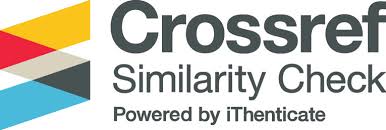Antibacterial Activity of Kalkon Derivative Compounds from Miristisin Nutmeg
Abstract
Nutmeg is a native Indonesian herb that has been used for food purposes such as spices and herbs, and the food industry. Miristisin is a typical compound that determines the quality of nutmeg oil and has several functional groups like allyl, phenyl, and ether. Kalkon derived compounds are secondary metabolites of flavonoids that have biological activities such as anticancer, cytotoxic, antimicrobial and antimalarial. The antibacterial properties are closely related to the α, β-unsaturated and the substituent of both aromatic rings, such as methylenedioxy groups, methoxy, Cl, Br, OH and so on. The aims of this study are to determine the antibacterial activity of kalkon derived from miristisin.
Antibacterial activity test was performed on Escheresia Coli (E. Coli) and Staphylococcus Aureus (S. Aureus) bacteria. Antibacterial activity test was done by diffusion method by using disc from kalkon derivative compound in acetone with 1,25%; 2.5%, 5% and 10% of concentration. The positive control of Ciprofloxacin 5μg and negative control of acetone solvent. The inhibit zone of each concentration are determine the antibacterial activity the result of antibacterial test showed ihibition diameter zone at 1.25%; 2.5%, 5% and 10% concentration in E. Coli bacteria were 13mm, 19mm, 22 mm and 26 mm, respectively, whereas in S. aureus bacteria were 7 mm, 7 mm, 9 mm and 19 mm, respectively. The results of the test showed the greater of sample concentration, the greater antibacterial activity. Strong antibacteria activity was shown in E.Coli bacteria with concentration of 10%, while at the same concentration showed moderate activity in S.Aureus bacteria.













